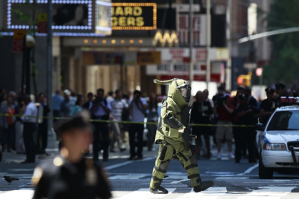
Terrorism is hitting North Americans close to home following Wednesday's shooting at the Canadian Parliament by a man with alleged jihadist interests, and Thursday's attack on two New York City police officers by an ax wielding Muslim convert. Though both attackers were shot dead at the scene by authorities, a Canadian solider was killed during the incident in Ottawa, and the real threat of aggressive Islamic internet propaganda reared its ugly head.
Described by Rep. Michael McCaul, chairman of the House Homeland Security committee, as "people living in a basement and very hard to stop," democrats and republicans alike are pressing President Obama to seriously address increasing numbers of terrorist acts - by both domestic and imported radicals on North American soil.
"The police and the military have to be on guard," said Dianne Feinstein, California Democratic Senator and chairwoman of the Senate Intelligence Committee. "We need to think in some new ways."
With weekly incidents on the rise, this "new way" must factor in the numbers of terrorists who self-radicalize through websites that target individuals with mental instabilities, those considered to be loners, and those who despise the U.S.
"One of the problems in trying to prevent lone wolf style attacks is that there are a countless number of scenarios of types of individual," said Mike Baker, a former CIA covert operations officer, on Fox's The Kelly File. "One latches on to something...the Islamic state or al Qaida ramblings online. And then there's the actual convert or Muslim who in the classical sense is radicalized. A true believer."
As Baker said, militant groups like the Islamic State in Iraq and Syria do not care about the true dedication, mental state or age of these converts as long as they will commit an act of terror.
And the internet has proven to be an incubator of autonomy for these types of individuals.
"The truth of the matter is, to open a file and start an investigation on an individual who's been identified - maybe he's been radicalized, or maybe he's in the process of self-radicalization - law enforcement has to jump through a significant number of hoops," Baker said.
And according to Homeland Security Secretary Jeh Johnson, lone wolf attacks are now America's greatest terror concern.
Baker points to the lackadaisical attitude of the Obama administration which has caused an inadvertent dismantling of America's ability to successfully battle militant groups.
"We're in a dilemma right now," he said. "Over the last couple of years the narrative from the White House has been we've decimated al Qaida, let's forget about the war on terror - let's forget about it because were tired of."
Even the Department of Justice informed the FBI that it will not use religion as a factor in threat monitoring of suspicious behavior. This lack of aggressive pursuit of viewers of extremist religious group's websites does not quell Feinstein's concerns.
"You have to ferret it out," she said. "You have to be able to watch it, and you have to be able to disrupt them." A disruption would require a full-fledged war on terror, led by President Obama - one that he empowers agencies like the DOJ and FBI to enforce. It would also require a plan to deal with potential terrorists who are apprehended before an attack is carried out.
And as McCaul told ABC's 'This Week', "It's like finding a needle in a haystack, then getting (converts) out of that radicalization."






